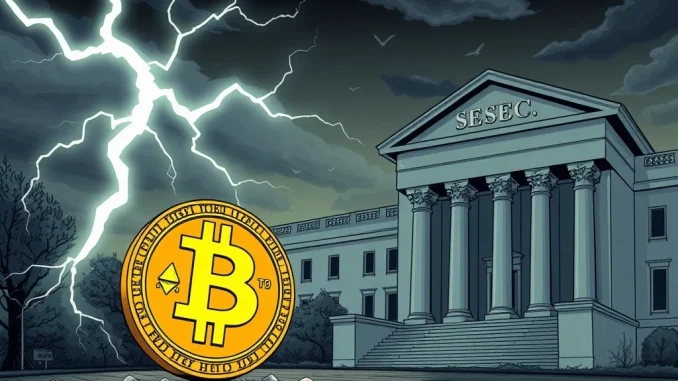
The cryptocurrency world was left reeling recently after the U.S. Securities and Exchange Commission (SEC) delivered a one-two punch that sent shockwaves through the market. What started as a monumental step forward for institutional adoption quickly turned into a bewildering setback. This isn’t just another headline; it’s a critical moment that highlights the ongoing tension between innovation and regulation in the digital asset space, particularly impacting the narrative around Bitcoin News Today.
A Brief Glimpse of Hope: The Bitwise ETF Approval
On July 22, the crypto community buzzed with excitement. The SEC had officially approved the Bitwise 10 Crypto Index Fund as a spot exchange-traded fund (ETF). This wasn’t just any ETF; it was the first diversified spot crypto ETF to receive regulatory clearance in the United States. Imagine the possibilities! A single product tracking ten major cryptocurrencies, including giants like Bitcoin (BTC), Ethereum (ETH), XRP, Solana (SOL), and Polkadot (DOT), suddenly seemed within reach for both institutional and retail investors. Bitwise’s $1.7 billion fund, known for its monthly rebalancing, was hailed as a flagship product and a potential game-changer for broader market access.
For years, the crypto industry has pushed for such products, seeing them as vital bridges between traditional finance and the nascent digital asset economy. A diversified ETF promised to simplify investment, mitigate some risks associated with single-asset exposure, and provide a regulated, accessible entry point for a wider audience. The initial approval signaled a potential shift in the SEC’s cautious stance, fostering optimism across the board.
The Sudden U-Turn: What Happened with the SEC Crypto ETF?
However, the celebration was short-lived. Mere hours after its groundbreaking approval, the SEC revoked the decision through a legal stay. The official reasoning? Rule 431 of the Securities Act. Assistant Secretary Sherry R. Haywood clarified that the pause was necessary for the agency to “review whether the delegated approval aligned with its evolving standards for crypto ETFs.”
This isn’t an isolated incident. The pattern eerily mirrored recent actions involving Grayscale’s multi-asset crypto fund, where approvals were similarly revoked for full commission review. Such reversals create significant regulatory uncertainty, leaving investors and industry participants scratching their heads. As one legal source put it, it felt like “funny business.”
Key takeaways from the reversal:
- Regulatory Scrutiny: The SEC is clearly taking a hyper-cautious approach to crypto products, even after initial staff-level approvals.
- Internal Disagreement: The quick reversal suggests potential internal disagreements or a lack of unified consensus within the SEC regarding crypto regulation.
- Evolving Standards: The agency’s mention of “evolving standards” indicates that their framework for evaluating crypto ETFs is still very much in flux, creating an unpredictable environment for applicants.
The Quest for a Diversified Crypto ETF: Broader Implications
The Bitwise saga casts a long shadow over other pending crypto ETF proposals. Applications for Bitcoin and Ethereum redemption mechanisms, as well as Solana-tracking products, have faced indefinite holds. Observers speculate that the SEC’s primary goal is to finalize a unified framework for digital asset ETFs before allowing broader approvals, especially for baskets of altcoins or newer tokens.
The current regulatory processes, such as the 19b-4 review, can extend decision-making timelines by up to 240 days per filing. This creates significant bottlenecks for firms like Bitwise and Grayscale, who are investing considerable resources into these applications. The SEC’s reluctance to establish clear listing criteria means each application is evaluated on a case-by-case basis, prolonging clarity for market participants and hindering the development of a robust, regulated market for Diversified Crypto ETF products.
The Impact on the Bitwise ETF and Future Filings
For Bitwise, the experience is undoubtedly frustrating. Their $1.7 billion fund, poised to make history, found itself in regulatory limbo within hours. While the SEC’s stay is not a definitive rejection, it effectively puts the product on ice, delaying market access and dampening the immediate enthusiasm. This situation underscores the immense challenges faced by asset managers attempting to bring innovative crypto products to market under the current regulatory climate.
The broader message for firms considering similar filings is clear: expect intense scrutiny and be prepared for potential delays or even reversals, even after initial positive signals. The path to a fully approved and operational Bitwise ETF (or any similar diversified product) remains fraught with regulatory hurdles.
Navigating the Volatile Crypto Market Regulation Landscape
The approval’s brief existence and subsequent reversal highlight the SEC’s internal tension between fostering innovation and enforcing traditional regulatory guardrails. While the agency acknowledges the growing demand for crypto investment vehicles, its reluctance to establish clear listing criteria keeps the sector in limbo. The lack of standardized rules means each application is evaluated on a case-by-case basis, prolonging clarity for market participants.
This inconsistency creates a challenging environment for the entire Crypto Market Regulation landscape. Investors and firms now face a dual challenge: navigating an inconsistent approval process while adapting to an evolving legal landscape. The agency’s focus on refining its approach suggests that future decisions may prioritize consistency over speed, though the exact timeline remains unclear. For now, the crypto industry watches closely, hoping for clearer guidelines and a more predictable path forward.
What Does This Mean for Investors?
For everyday investors, this development reinforces the need for caution and due diligence when considering crypto investments. While the long-term trend towards institutional adoption remains, the short-term regulatory uncertainty can lead to significant market volatility. It’s crucial to stay informed about regulatory developments and understand that the path to widespread, regulated crypto investment vehicles is still being paved, often with unexpected detours.
The SEC’s recent actions serve as a stark reminder of the complexities inherent in regulating a rapidly evolving asset class. While the initial approval of the Bitwise diversified crypto ETF offered a tantalizing glimpse of potential regulatory acceptance, its abrupt halt reinforced skepticism about the SEC’s ability to balance risk management with market access. The crypto community remains hopeful for a clearer, more consistent regulatory framework, but for now, navigating the digital asset space continues to require a keen eye on regulatory shifts and an understanding of their immediate and long-term implications.
Frequently Asked Questions (FAQs)
Q1: What was the significance of the Bitwise 10 Crypto Index Fund’s initial approval?
A1: It marked the first time a diversified spot crypto ETF, tracking ten major cryptocurrencies including Bitcoin and Ethereum, received regulatory clearance in the United States. This was seen as a major milestone for institutional and retail access to crypto markets.
Q2: Why did the SEC revoke the approval so quickly?
A2: The SEC cited Rule 431 of the Securities Act, stating the order would remain pending until further instructions. They clarified that the pause allowed the agency to review whether the delegated approval aligned with its “evolving standards for crypto ETFs.”
Q3: How does this situation compare to other crypto ETF applications?
A3: This pattern mirrored recent actions involving Grayscale’s multi-asset crypto fund, where approvals were similarly revoked. It also indicates potential delays for other pending applications, such as those for Bitcoin and Ethereum redemption mechanisms or Solana-tracking products.
Q4: What is the SEC’s likely long-term goal regarding crypto ETFs?
A4: Observers speculate that the SEC aims to finalize a unified and comprehensive framework for digital asset ETFs before allowing broader approvals, particularly for diversified products or newer altcoins. They appear to be prioritizing consistency over speed.
Q5: What does this mean for investors interested in diversified crypto exposure?
A5: While the demand for such products is clear, the regulatory uncertainty means investors should exercise caution. The path to regulated diversified crypto ETFs is still developing, and unexpected regulatory actions can impact market stability and product availability.



